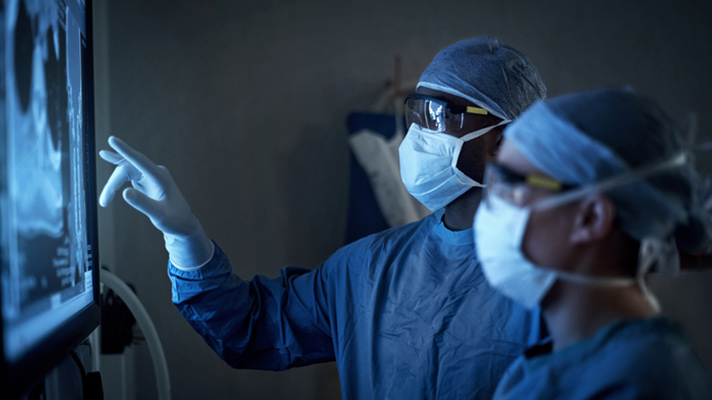
Researchers from New York-based Mount Sinai Health System have combined artificial intelligence, imaging and clinical data to rapidly detect COVID-19 in patients.
For a study published recently in Nature Medicine, researchers used AI algorithms along with chest CT scans and patient history to rapidly detect patients who were positive for COVID-19 and improve the detection of patients who presented with normal CT scans.
According to Dr. Zahi Fayad, director of the BioMedical Engineering and Imaging Institute at the Icahn School of Medicine at Mount Sinai, faculty members working with an international team implemented “a novel AI model using CT data from coronavirus patients in Chinese medical centers” and “were able to show that the AI model was as accurate as an experienced radiologist in diagnosing the disease, and even better in some cases where there was no clear sign of lung disease on CT.”
Because the symptoms of COVID-19 are non-specific, it can be difficult to diagnose. For the study, the Mount Sinai team integrated data from the CT scans from more than 900 patients with the clinical information to develop an AI algorithm that mimics the workflow a physician uses to diagnose COVID-19 and gives a final prediction of positive or negative diagnosis.
CT scans are not widely used for diagnosis of COVID-19 in the United States, but Dr. Fayad explained that imaging can still play an important role.
“Imaging can help give a rapid and accurate diagnosis–lab tests can take up to two days, and there is the possibility of false negatives–meaning imaging can help isolate patients immediately if needed, and manage hospital resources effectively. The high sensitivity of our AI model can provide a ‘second opinion’ to physicians in cases where CT is either negative (in the early course of infection) or shows nonspecific findings, which can be common. It’s something that should be considered on a wider scale, especially in the United States, where currently we have more spare capacity for CT scanning than in labs for genetic tests.” explained Dr. Fayad, who is also a Professor of Diagnostic, Molecular and Interventional Radiology at the Icahn School of Medicine at Mount Sinai.
Mount Sinai researchers say their next steps will be to further develop the model to forecast patient outcomes and to share their results with other healthcare facilities.
"This study is important because it shows that an artificial intelligence algorithm can be trained to help with early identification of COVID-19, and this can be used in the clinical setting to triage or prioritize the evaluation of sick patients early in their admission to the emergency room," said Dr. Matthew Levin, director of the Mount Sinai Health System's clinical data science team.


